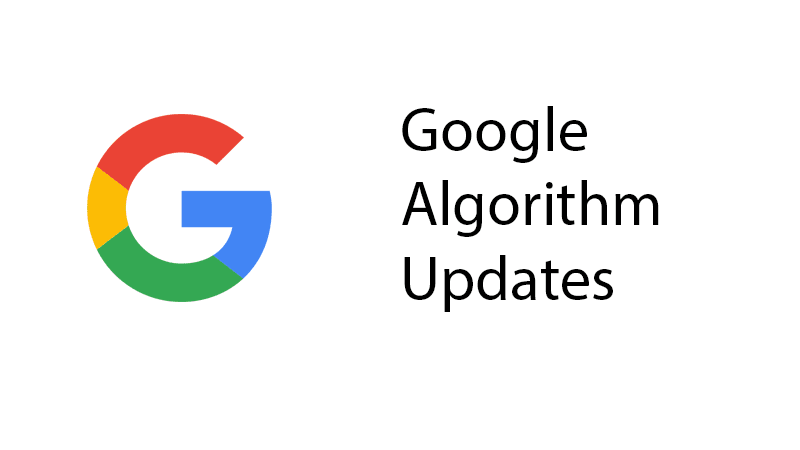How Search Engine Algorithm Works - Important Google Algorithm Updates
Complete information about Google Algorithm: If you are a blogger or SEO person, you must have heard about the Google algorithm at some point in time; these algorithms are essential for ranking any website.
Most of us do not pay much attention to the Google algorithm, and if suddenly the website traffic goes down, then we do not even know why.
But if you know about every new update of the Google algorithm, your website ranking will not be down; if it ever goes down, you will get your ranking again.
So, This article will give you complete information about google algorithm updates; what is a google algorithm? And terms & definitions you need to know, So those who want to earn money by working online or in the field of blogging must be aware of it.
{tocify} $title={Table of Contents}
What is Google Algorithm
Google Algorithm is a complex system by which Google provides the best possible results on the user's search query in its search engine.
Google uses a combination of algorithms and several ranking factors to deliver webpages relevant to the user's question on its Search Engine Result Pages (SERPs).
Google keeps making regular changes to improve users' experience with its search engine at various levels. And all these changes come under the Google algorithm itself.
Whenever you search for any information on Google, The search engine generates a search result page in seconds on your search query, in which thousands of millions of results come; now here, Google's algorithms decide which of the web pages to be shown above the search result and which at the end.
The algorithm of the Google search engine is very complex, which is difficult for every user to understand. Google takes the help of algorithms to show you the best results on SERP.
In its initial phase, Google made only a few updates to its search engine. However, every year, Google updates its search engine to improve it.
You can check Google search engine algorithm updates on the official Twitter handle of Google SearchLiaison.
Why does Google keep updating its algorithms?
Since Google was formed, they understood the extreme importance of providing better and more accurate results for search users.
In the early years, Google used to update only a few of its algorithms. But, as time passed, updates became more frequent and often unannounced.
This is because Google wanted to deliver higher quality, relevant search results and prevent users from manipulating the system.
How does Google Algorithm work?
When a user searches by entering his keyword in the search engine, then google shows the best quality content about that keyword on your SERPs page.
To better understand how google's algorithm works, you need to know that there are search engines like google, yahoo, and bing; how do all these work?
If you want to know, then you read my SEO post. What is SEO? I have told its basics in it.
As we told you above, Google Algorithm is a very complex system that is not possible for an average user to understand. Still, here we will brief you on how Google Algorithm works.
Before getting a website ranked, the Google search engine has to go through some processes, which are as follows -
- Crawling - First, Google's crawlers crawl all the web pages on the Internet and try to understand what type of content is written on them.
- Indexing - After crawling the webpage, if that page is indexable, then the crawlers index that webpage. A webpage appears on the SERP only when it is indexed.
- Ranking - After indexing the webpage, finally, Google search engines rank the relevant website of the user's query on the SERP based on their algorithm.
Google has many algorithms and ranking factors by which Google ranks the best webpages relevant to the search engine query in the top position or first page.
You always get to read the best and high-quality content on your query on Google; all this is possible due to the Google algorithm.
What To Do If Google Algorithm Update Has A Negative Effect On Your Website?
- Be patient - Core Updates take a few days to roll out. So do not take any action immediately.
- Trust only trusted sources - Do not blindly trust anyone on the Internet. Trust only 100% Verified Experts. ( like searchenginejournal, MOZ or Semrush )
- Improve - If you have a problem with your website, identify and fix it.
When and How Do We Get Google Penalty?
There is no specified time to get Google Penalty or Website Penalized. Anytime any update can Hit your website with a Penalty.
OR, There can be many reasons for this, which have been mentioned below.
1. Keeping Low-Quality Content.
2. Doing Keyword Stuffing.
3. Creating Low-Quality Back Links.
4. Making Spam Directory Submission.
5. Creating Over Optimized Anchor Link Text.
6. Buying Backlinks.
7. Having Duplicate Content.
8. Many 404 Errors are coming together, and they are not getting the correct redirection.
9. Creating backlinks to websites in a language other than the website language.
10. Having Link Juice, Unnaturally Passed in Footer Links.
11. Increase of High Bounce Rate.
12. Having Website Slow Speeds and Daily Downtime.
13. Approving Spam Comments.
14. Using Black Hat SEO.
15. Linking Unnatural and Hacking, Porn, Malware Infected Sides.
In this way, there are many other reasons too for Google Penalty. But mostly due to these reasons, any website is targeted in the eyes of Google. Let us now try to give you some information on the google algorithm updates.
Major Google Algorithm Updates You Need to Know for Your SEO Planning
By the way, some updates come every day in Google's algorithm. So, here we will learn about some of the major updates in Google Algorithm so far.The following are the major updates of the Google algorithm:
| Google algorithm update | when was it released | update purpose |
|---|---|---|
| Panda | 2011 | quality content check |
| Penguin | 2012 | check spam links |
| Payday | 2013 | targeting spam sites |
| Hummingbird | 2013 | Relevance in query and content |
| Pigeon | 2014 | local search algorithm |
| Mobilegeddon | 2015 | mobile-friendly website |
| Rank Brain | 2015 | recognize User Intent |
| Fred | 2018 | improve user experience |
Google Panda algorithm update
Google released the Panda update in the year 2011. This algorithm checks the website's content, such as whether your content is genuine or not, whether the user is getting some benefit from the content, whether the content has any meaning, how long the content is etc.After the Panda update, there was a massive loss in ranking for those websites that did not publish genuine content.
What did the Google Panda update target?
The Google Panda updates penalized sites with a variety of optimization issues. Still, some of the most common are included below:
- Content farms: Sites that copy content from another website without adding their own value.
- Keyword stuffing: Keyword stuffing means writing any particular keyword repeatedly in the article to manipulate the search engine rankings.
- Low-quality guest posts: Sites that publish poor-quality articles written by guest authors.
- Ad Heavy pages: Pages with too many ads ( you can set up Google AdSense Auto ads ).
What is Google Penguin Algorithm Update
The main task of Penguin Update was to check such spam links of any website, which is benefiting it in ranking.
Websites that had created Link Farming or Spam Backlinks to get a good ranking in search engines went down after the Penguin update.
What Is Google Payday Algorithm
Google Payday algorithm is a set of other algorithm updates whose main objective is to recognize and penalize the websites that use search engine spam techniques to enhance their ranks and traffic.
We know that ranking takes a lot of time and dedication, but using illegal ways is not a good idea to rank high.
Google's payday algorithm filter out low-quality websites that use unwanted practices to boost their rankings.
Google's Hummingbird Algorithm
After this update, Google outranked all such website rankings using Black Hat SEO. And in the Hummingbird update, such websites benefited in ranking whose content was relevant to the user's query.
Google Pigeon [Algorithm Updates]
Google's Pigeon update is one of the most significant local search algorithm updates of all time; local businesses benefited greatly after this update.
If a user searches Packers and Movers in Mumbai, he will see packers and movers of Mumbai in the top position of the search result page.
After the Pigeon update, there was a lot of improvement in Local SEO.
Mobilegeddon: Google’s Mobile-Friendly Algorithm Update
The job of the Mobilegeddon algorithm update was to check whether a website is mobile-friendly and whether the website fits all screens.
Around 2015, the use of mobiles increased rapidly. Due to this, more people accessed the Internet from mobile than from desktop, so Google rolled out the Mobilegeddon update.
In today's time, Google has many advanced algorithms for mobile-friendly testing of websites, such as Core Web Vital, but they all started with Mobilegeddon.
Understanding Google Rank Brain Algorithm?
Rank Brain is such an algorithm of Google by which Google search engine can better understand the intention behind doing any query, i.e. search intent.
Whenever a user searches something on Google, they have some intention behind doing that query, understanding the user's intent and showing him the best result; Google released Rank Brain Update.
Guide to the Google Fred Algorithm?
This update affects those sites that focus only on; Too many ads, Thin content, Poor link quality, Poor content quality, Aggressive affiliate linking and do not give much attention to the Users/Visitors. In the Fred update, Google downgraded the ranking of websites that spoil the user experience.So, friends, these were the eight most essential updates of Google; keeping all these points in mind, you should do SEO of your website; otherwise, your website will not be able to perform well in the search engine.
FAQs: Google Algorithm
Q1. What is Page Rank?
Ans: PageRank (PR) is Google's major technique for ranking web pages for placement on a search engine results page (SERP).
PageRank refers to the system and the algorithmic procedure that Google uses to rank pages and the numerical value assigned to pages as a score.
Q2. Do Google's algorithms matter in SEO?
Ans: Yes, if you work against them, you can get a penalty.
Q3. What is another name for Google's algorithm?
Ans: Another name for the Google algorithm is page rank.
Q4. Is it necessary to read the Google algorithm?
Ans: Yes, this is for you if you are a website owner.
Conclusion: Google Algorithm
If you want your website to rank high, you should always work on your site in genuine ways. At the same time, you should also be aware of every new Google algorithm update.
Friends, according to my expertise, I have written complete information about Google Algorithm to help you. If this post is favourable for you or not, please tell me by commenting.
In today's article, Friends, we have discussed What is google algorithm, how it works and the importance of google algorithm updates., I hope you enjoyed reading this blog post.
If you liked this post, do not forget to share it with your friends so they can get information about it.
You can ask us through comments if you still have questions or doubts, I will answer all your questions, and you can contact us for more information.
Please tell us through the comment section if you think we miss anything.
THANK YOU. HAVE A NICE DAY.








.png)

